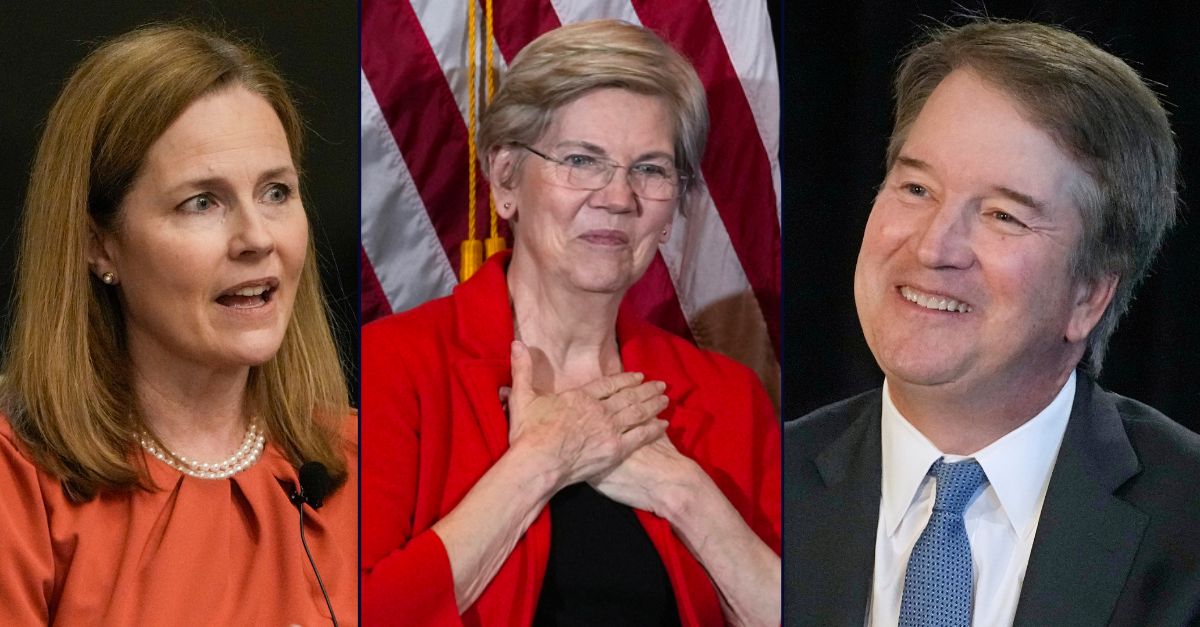
Left: Supreme Court Justice Amy Coney Barrett speaks during the Seventh Circuit Judicial Conference Monday, Aug. 28, 2023, in Lake Geneva, Wis. (AP Photo/Morry Gash). Center: U.S. Sen. Elizabeth Warren, D-Mass., acknowledges an audience member during a town hall meeting, Wednesday, April 12, 2023, in the Roxbury neighborhood of Boston. (AP Photo/Charles Krupa). Right: Justice Brett Kavanaugh smiles as he speaks at a judicial conference, Thursday, Sept. 7, 2023, in Cleveland. (AP Photo/Sue Ogrocki)
The U.S. Supreme Court on Tuesday heard oral arguments in a case that could effectively eliminate the lone federal agency charged with protecting borrowers from predatory lending practices.
Stylized as Consumer Financial Protection Bureau v. Community Financial Services Association of America, Limited, the justices’ decision could lead to a broad array of financial and regulatory uncertainty with significant impacts on markets and consumers.
The Consumer Financial Protection Bureau (CFPB) was established in 2011 in the aftermath of the 2008 financial crisis as part of the Dodd-Frank Wall Street Reform and Consumer Protection Act. Originally a broader attack on payday loan rules, the extant complaint against the watchdog was lodged by two trade groups representing payday loan lenders (CFSA) and is premised on the agency’s funding mechanism.
Congress sought to insulate the CFPB from political pressure by not subjecting its operating budget to the annual appropriations process. Instead of being authorized by Congress each year, the agency is funded by a standing appropriation law that authorizes funds to be drawn from the Federal Reserve – at the discretion of the CFPB director – and caps those requests at 12 percent of “the total operating expenses of the Federal Reserve System.”
The conservative U.S. Court of Appeals for the Fifth Circuit used the CFSA challenge to issue a broad ruling that found the agency’s funding mechanism unconstitutional and invalidated the 2017 Payday Lending Rule as requested – while dismissing other arguments against the CFPB. The appellate court specifically said the agency’s funding mechanism violates a constitutional requirement that funds be subject to the appropriations process and that the standing appropriation law was an abdication of the congressional power of the purse in violation of the separation of powers. By finding the agency has an “unconstitutional funding scheme,” every CFPB regulation and enforcement action could be overturned in similar fashion.
On Tuesday, U.S. Solicitor General Elizabeth Prelogar argued that the courts have no authority to hamstring the agency or second guess Congress because the former has clearly made an appropriation.
Speaking on the CFPB’s behalf, she noted that over 60 percent of the federal budget is made up of standing appropriations and that the 2022 budget contains “more than 400 such uses” of spending authorized by Congress and subject to a congressionally-defined cap.
“Congress has appropriated in this way from time immemorial,” Prelogar said. “It is the norm in appropriations law.”
Justice Clarence Thomas mused about how Congress often uses appropriations “to check the executive branch to some extent” and asked how that dynamic plays out with regard to the CFPB. As Prelogar began to answer, Thomas cut her off to suggest the CFPB’s funding mechanism “kind of eviscerates the kind of exacting control that Congress usually exercises in the appropriations process.”
Chief Justice John Roberts framed the case as a paradox between congressional power and the increasing power of the executive.
“You have a very aggressive view of Congress’ authority under the appropriations clause – I’m not saying remotely that that’s not correct – but it struck me that you represent the executive branch as well,” he said. “And it’s a very strong power given to Congress. And it struck me that the reason you would want to defend that is because it gives them more power to give away.”
Prelogar said those concerns were generally not misplaced, but had no relevance in the CFPB’s case because their funding is “a very specific type of appropriation that’s actually far more constrained than many that Congress has enacted throughout history.”
Justice Neil Gorsuch, following up on the chief justice’s line of thought, asked the solicitor general what role “the upper limit” plays in whether or not a hypothetical standing appropriation law similar to the CFPB’s funding mechanism, in the future, might pose constitutional problems.
Both Roberts and Gorsuch appeared concerned with the provision that allows the CFPB director – who is part of the executive branch – to determine the agency’s own budget subject to the 12 percent cap. Gorsuch raised the notion of another agency director not subject to a cap and floated the idea of an agency requesting “a trillion dollars.”
Prelogar replied that such theoretical excesses could apply to various governmental agencies but were not at issue in the present case.
Justice Elena Kagan picked that same issue back up by asking whether the president could get Congress to pass a law authorizing him to spend “a quadrillion dollars” to fund the entire federal government except the Army “as he deems fit” – an example directly drawn from a reply brief by the payday lender parties.
“That statute, as we understand it, would be completely unprecedented,” Prelogar said. “It would effectively take the whole of Congress’ appropriations authority and transfer it to the executive branch. Congress has never done that for the past 230-plus years and it’s hard for me to imagine Congress ever would do that.”
Read Related Also: Off-Duty Pilot Accused of Trying to Shut Down Jet’s Engines Mid-Flight Did Psychedelic Mushrooms Before Flight
Such an historical anomaly, Prelogar said, would be strong evidence for a court to look at and judge harshly. But, she said, “history works both ways,” citing from a previous high court ruling that found historically-accepted methods “of structuring government” is powerful evidence that a disputed method is constitutional.
“I would urge the court to save for another day whether Congress could go too far with an appropriation we’ve never seen before,” Prelogar added.
The justices, for their part, seemed mostly inclined to agree with the government on the CFPB’s funding mechanism. While Prelogar was occasionally raked through hypothetical coals as applied to the facts, even many conservative justices struggled to accept the understanding of the Constitution and the law advanced by the payday lenders’ attorney Noel Francisco, who previously served as the solicitor general under the Trump administration.
Francisco characterized the CFPB as “the most independent agency in American history” and said that “Congress has never authorized an agency to pick its own annual appropriation.”
The semi-novelty of the agency’s funding mechanism did not appear to be particularly convincing.
“I get your point that this is different, that it’s unique, that it’s odd, that they’ve never gone this far,” Thomas told the payday lenders’ attorney. “But not having gone this far is not a constitutional problem.”
Justice Brett Kavanaugh indicated that his prior reservations with the structure of the CFPB were largely quelled in Seila Law LLC v. Consumer Financial Protection Bureau, where the Supreme Court invalidated the agency’s original leadership framework.
Kavanaugh directly took issue with how Francisco described the CFPB’s funding source as a”perpetual delegation to pick your own number.”
“Congress could change this tomorrow,” the justice lectured the attorney. “There’s nothing perpetual or permanent about this.”
In response to a scathing series of questions from Justice Ketanji Brown Jackson, Francisco was forced to concede there is nothing specifically in the constitutional text that supports the idea “appropriations” means a set amount – like a line-item budget.
Justice Amy Coney Barrett seized on that concession.
“You were just saying to Justice Jackson that there’s nothing in the appropriations clause itself – or in the word ‘appropriations’ – that imposes the limits that you’re talking about,” the newest conservative justice said.
Francisco, for his part, attempted to dial his admission back but the broader sense of the court seemed to be that the appropriations clause is more about Congress exercising its prerogative to spend – instead of the executive initiating spending – and not the amount of the expenditure or how it chooses to issue such spending.
The CFPB is the brainchild of Sen. Elizabeth Warren, D-Mass., who conceived the idea when she taught law at Harvard.
In the ensuing turmoil and anger of the 2008 financial crisis and the bailout of the banking system, Warren served as the chair of the congressional oversight panel that eventually proposed and established the CFPB. She would go on to serve as a special adviser integral to how the agency was ultimately established.
Considered a somewhat left-of-center politician, Warren’s trademark legislative achievement may yet be saved by GOP-appointed justices.
Have a tip we should know? [email protected]







